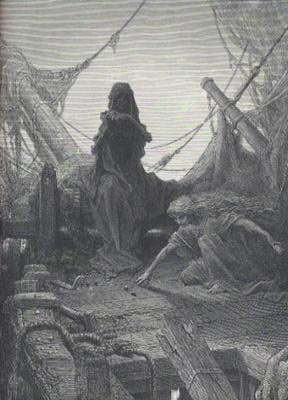From one of the great Catholic poets of the Glorious 17th Century.
A Hymn to the Name and Honour of the Admirable Saint Teresa
Richard Crashaw
LOVE, thou are absolute, sole Lord
Of life and death. To prove the word,
We'll now appeal to none of all
Those thy old soldiers, great and tall,
Ripe men of martyrdom, that could reach down
With strong arms their triumphant crown:
Such as could with lusty breath
Speak loud, unto the face of death,
Their great Lord's glorious name; to none
Of those whose spacious bosoms spread a throne
For love at large to fill. Spare blood and sweat:
We'll see Him take a private seat,
And make His mansion in the mild
And milky soul of a soft child.
Scarce has she learnt to lisp a name
Of martyr, yet she thinks it shame
Life should so long play with that breath
Which spent can buy so brave a death.
She never undertook to know
What death with love should have to do.
Nor has she e'er yet understood
Why, to show love, she should shed blood;
Yet, though she cannot tell you why,
She can love, and she can die.
Scarce has she blood enough to make
A guilty sword blush for her sake;
Yet has a heart dares hope to prove
How much less strong is death than love....
Since 'tis not to be had at home,
She'll travel for a martyrdom.
No home for her, confesses she,
But where she may a martyr be.
She'll to the Moors, and trade with them
For this unvalued diadem;
She offers them her dearest breath,
With Christ's name in 't, in charge for death:
She'll bargain with them, and will give
Them God, and teach them how to live
In Him; or, if they this deny,
For Him she'll teach them how to die.
So shall she leave amongst them sown
Her Lord's blood, or at least her own.
Farewell then, all the world, adieu!
Teresa is no more for you.
Farewell all pleasures, sports, and joys,
Never till now esteemed toys!
Farewell whatever dear may be--
Mother's arms, or father's knee!
Farewell house, and farewell home!
She 's for the Moors and Martyrdom.
Sweet, not so fast; lo! thy fair spouse,
Whom thou seek'st with so swift vows,
Calls thee back, and bids thee come
T' embrace a milder martyrdom....
O how oft shalt thou complain
Of a sweet and subtle pain!
Of intolerable joys!
Of a death, in which who dies
Loves his death, and dies again,
And would for ever so be slain;
And lives and dies, and knows not why
To live, but that he still may die!
How kindly will thy gentle heart
Kiss the sweetly-killing dart!
And close in his embraces keep
Those delicious wounds, that weep
Balsam, to heal themselves with thus,
When these thy deaths, so numerous,
Shall all at once die into one,
And melt thy soul's sweet mansion;
Like a soft lump of incense, hasted
By too hot a fire, and wasted
Into perfuming clouds, so fast
Shalt thou exhale to heaven at last
In a resolving sigh, and then,--
O what? Ask not the tongues of men.
Angels cannot tell; suffice,
Thyself shalt feel thine own full joys,
And hold them fast for ever there.
So soon as thou shalt first appear,
The moon of maiden stars, thy white
Mistress, attended by such bright
Souls as thy shining self, shall come,
And in her first ranks make thee room;
Where, 'mongst her snowy family,
Immortal welcomes wait for thee.
O what delight, when she shall stand
And teach thy lips heaven, with her hand,
On which thou now may'st to thy wishes
Heap up thy consecrated kisses!
What joy shall seize thy soul, when she,
Bending her blessed eyes on thee,
Those second smiles of heaven, shall dart
Her mild rays through thy melting heart!
Angels, thy old friends, there shall greet thee,
Glad at their own home now to meet thee.
All thy good works which went before,
And waited for thee at the door,
Shall own thee there; and all in one
Weave a constellation
Of crowns, with which the King, thy spouse,
Shall build up thy triumphant brows.
All thy old woes shall now smile on thee,
And thy pains sit bright upon thee:
All thy sorrows here shall shine,
And thy sufferings be divine.
Tears shall take comfort, and turn gems,
And wrongs repent to diadems.
Even thy deaths shall live, and new
Dress the soul which late they slew.
Thy wounds shall blush to such bright scars
As keep account of the Lamb's wars.
Those rare works, where thou shalt leave writ
Love's noble history, with wit
Taught thee by none but Him, while here
They feed our souls, shall clothe thine there.
Each heavenly word by whose hid flame
Our hard hearts shall strike fire, the same
Shall flourish on thy brows, and be
Both fire to us and flame to thee;
Whose light shall live bright in thy face
By glory, in our hearts by grace.
Thou shalt look round about, and see
Thousands of crown'd souls throng to be
Themselves thy crown, sons of thy vows,
The virgin-births with which thy spouse
Made fruitful thy fair soul; go now,
And with them all about thee bow
To Him; put on, He'll say, put on,
My rosy Love, that thy rich zone,
Sparkling with the sacred flames
Of thousand souls, whose happy names
Heaven keeps upon thy score: thy bright
Life brought them first to kiss the light
That kindled them to stars; and so
Thou with the Lamb, thy Lord, shalt go.
And, wheresoe'er He sets His white
Steps, walk with Him those ways of light,
Which who in death would live to see,
Must learn in life to die like thee.

